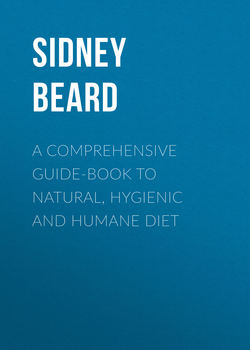Читать книгу A Comprehensive Guide-Book to Natural, Hygienic and Humane Diet - Beard Sidney Hartnoll - Страница 4
A PLEA FOR MODERATION
ОглавлениеOne of the most frequent mistakes made by those who commence to live upon a fleshless diet is that of eating too much – an error, also committed by the general public. Often, through ignorance of the fact that lean beef consists of water to the extent of about 75 %, and through having been brought up under the spell of the popular delusion that meat is a great source of strength and stamina, they jump to the conclusion that they must consume large plates of cereals and vegetables in order to make up for their abstinence from animal food. They bring upon themselves severe attacks of dyspepsia – either by eating excessive quantities of starch in the form of porridge, bread and potatoes, or of such concentrated foods as haricots, lentils or nuts (being ignorant of the fact that these latter are much more nutritious than lean beef and that only a very small quantity is needed for a sufficient meal)2.
Nothing does more injury to the Food-Reform Movement than the discredit which is brought upon it by those who upset themselves by over-eating, and who feel led to justify their defection by attacking the system they have forsaken. Among the numerous cases brought to my notice, I remember one of a minister's wife, who by partaking of seven meals a day, and finishing up at ten o'clock in the evening with cocoa, cheese and porridge, brought herself to such a state of nervous prostration that her local doctor ordered her to return to a flesh diet, "as she required nourishment." He thus diagnosed her condition, instead of attributing it to preposterous over-feeding.
A Golden Rule for every food-reformer is this —Eat only when you are hungry, and never to repletion. An exception must be made, however, in certain cases of anæmic and delicate persons. When there is not sufficient vitality to cause appetite, or to digest food normally, it is often necessary to insist on regular meals being taken, notwithstanding the patient's distaste for food. Drowsiness and stupor after a meal are sure signs of excess, and I cannot too strongly urge temperance in diet. During my long experience of philanthropic work as an advocate of natural and hygienic living, I have only heard of a few cases of persons suffering any ill effects from eating too little, whereas cases of the opposite sort have been rather numerous. Ninety-nine per cent. of the centenarians of the world have been characterized by abstemiousness; however much their ways and customs may have otherwise differed, in this one respect they are practically alike – declaring that they have always been small eaters, and believers in moderation in all things.
2
See Table of Food Values.
